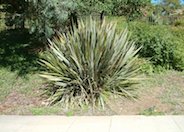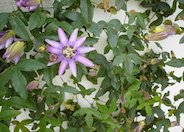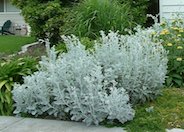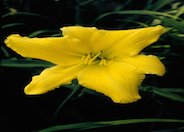
Common name:New Zealand Flax
Botanical name:Phormium tenax
New Zealand Flax is a large, bold plant with stiffly vertical, sword-like, green leaves that arise from its base. It should be grown under full sun for best color. Varieties will offer different growth habits and leaf color.

Common name:Broadmoor Juniper
Botanical name:Juniperus sabina 'Broadmoor'
This shrub/groundcover will grow 2-3' tall and 10' wide. It has soft, bright green leaves and is good for erosion control. It looks great on a hillside and tolerates ocean spray. It prefers full sun and is drought tolerant once it's established.

Common name:Passion Fruit
Botanical name:Passiflora edulis
The Passion Fruit Vine is famous for producing the "passion fruit". An purplish, egg-shaped fruit with a leathery hide reveals inside, a pudding-like mass, with edible seeds. It can be scooped out or sucked out of the halved fruit. This vine is often invasive.

Common name:Dusty Miller, Silver Groundsel
Botanical name:Senecio cineraria
The Dusty Miller exhibits growth to 1' or more, with velvet gray leaves that have broad, roundish lobes. Yellow flower heads appear through the middle of the plant during most months of the year. Cut heads back occasionally to encourage bushiness.

Common name:Bronze Loquat
Botanical name:Eriobotrya deflexa
A small, evergreen tree with large leaves that are reddish bronze and turn green as they mature, this loquat is highlighted by clusters of small, white, fragrant flowers that are borne in the spring on branch tips.

Common name:Daylily, D. Moon Hybrid
Botanical name:Hemerocallis 'D. Moon'
This Daylily has clear yellow blooms above handsome, grass-like, green foliage. Flowers are perched on thin wiry stalks, about 2' tall. It has even bloomed in January! But typically, you see blooms in spring. Daylilies prefer full sun and regular watering. Provide well draining soil and compost.
| Designer: | Pillars on Stacked Stone |
Photographer: GardenSoft |
Soils and Compost:
Maintain a two to four inch layer of mulch on the soil surface to reduce weeds, infiltrate rain water, and reduce compaction.
Water Saving Tip:
Integrated Pest Management:
Attract, or buy beneficial insects such as ladybugs and lacewings to control pest outbreaks in your garden.

